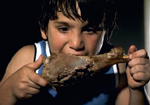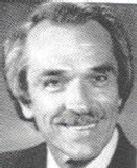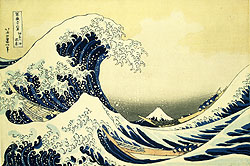Dysphoria, dressed up as Baudelarian Spleen, leads one to certain poets.
I began with Philip Larkin, searching out "Church Going," thinking of my own impulse to go into a church, and found the line
A serious house on serious earth it is
Yes, one can say that. It requires no leap of faith, no assumptions of transcendence, no fears of engaging in
mauvais foi.
Then I found "Aubade," an insomniac's fitful and harrowed
timor mortis, ending with morning, the workaday distractions resuming,
The sky is white as clay, with no sun.
Work has to be done.
Postmen like doctors go from house to house.
My dysphoria thus fueled, I turned to my favorite poem in this genre, Weldon Kees' "Equinox."
The setting is Northern, cold, winter. A "sequestered and snow-haunted world." An ancient, half-blind, dementing Spanish woman sits in a "claw-and-ball-foot chair" at a "frozen window" overlooking a bay. The world itself could be ending -- there are abandoned boats, dead fish on the shore, a few last corroding cans of beans on her shelf, a village whose chimneys no longer emit smoke, cottages where "no lights burn."
...Exile without remembrance,
spawned in the heat to perish in this cold,
Ravaged by paresis, and her sight at last
A blackness in the blood, she moves her chair
Inch by excruciating inch, her face
steered -- raw, blank, aching -- toward the beans:
The last survivor of the race.
Phew. That cuts us down to size, huh ? Reduced to blind appetite in a dying world.
Notice the irony of the title.
I wrote a poem about Kees in 1998. I'd written a book-length series called QABEN, ostensibly "about" the flooding of a central Massachusetts valley in the 1930's to form our "Quabbin Reservoir," but more about other historical obliterations, and watery purifications. I included in it homage to three poets: Berryman, Kees and Crane, all of who jumped to their water or not-water deaths from various rails -- Berryman off a bridge onto dry ground, Kees probably from the Golden Gate, and Crane off the side of a cruise ship into the sea. There are pictures of each of these men in their youth in their biographies in which, gaunt and mustachioed, they eerily resemble one another. Especially Crane and Kees.
I did massive reaearch for QABEN, including a hard-hatted tour of Boston Harbor's brand new Deer Island sewage treatment plant. (A logical and symmetrical end point for a series about drinking water, eh ?) Deer Island had been the site of a Native American concentration camp during King Philip's War, and subsequently of poorhouses, quarantine hospitals, orphanages and prisons. Finally, sewage treatment: the ultimate institution of "purification."
Here's my Kees poem, and its footnote.
7.18.55
Small wonder... /...that the sleuth, LeRoux, is now incurably insane
-- W. Kees, “
Crime Club”
At wits’ extreme, they summoned old LeRoux
from Langley Porter’s chronic, chronic ward.
A month of Thorazine had done what years
of depth analysis and shock could not:
had stopped his screams. It was something, anyway.
His trench coat gave off mildew, naphthalene.
-- Where are we going , please ? He winced and blinked
as dull green tile gave way to dull green air.
-- 1980 Filbert, Sir. Get in.
No nut joke passed the rookie driver’s lips.
He’d been forewarned. He’d heard of Jack LeRoux,
the crackerjack dick who’d cracked in ‘28.
They say each sleuth shall meet his waterloo,
his sinkhole of unfathomable clues.
His was the Potato Masher case. Jeez,
if the guy had been a bit more patient !
The door-to-door utensils man confessed
to everything -- the Shirley Temple con,
the sporting goods swindle, the death blow.
And now the reborn necromancer swayed
in the squad car’s back seat -- Excuse me,
officer, would you mind, the siren ? Please ?
The long-lost broken wavelets tugged at him
as they withdrew. He sighed. Just like old times --
the car abandoned by the Golden Gate.
The fog. No note. The cat called Lonesome gone.
The small apartment, festooned in yellow tape.
Red socks soaking in the bathroom sink.
On the kitchen floor, one dish of milk
curdling. Most of the Jack Daniels left.
Sheet music on the piano, blues. Bedside,
Unamuno’s Tragic Sense Of Life,
Dostoevsky’s The Devils. LeRoux sneezed.
They handed him the transcripts, interviews --
the usual friends, in grief’s confessional,
recalling clues they’d lost, pooh poohed, ignored.
“I think Hart Crane had the right idea.”
“I couldn’t get my foot over the rail.”
“I may go to Mexico. To stay.”
“What keeps you going ?” “Things are pretty bad.”
“Nobody seems to be doing anything.”
“I won’t.” “I won’t.” -- And then he curveshipped out,
is that it ? Shrill shirt ballooning like a sail ?
Posterity will have him puttering
into his dotage in some hacienda,
or dead, and that’s the warble of it, men --
the bathers leave the water, their smiles fade,
the roof opens to one last monstrous flood,
and I, I must be getting back. It’s time
for medication, hydrotherapy
and supper, beans tonight I think. I like
baked beans. Spaghetti. Chocolate milk. Pie.
Tuesday’s television night. Wednesday’s crafts.
I’m doing better lately. It’s so strange.
(The poet Weldon Kees disappeared on 7.18.55. His car was found near the Golden Gate Bridge. Langley Porter is a famous psychiatric hospital in San Francisco. Details in stanzas 5-7 are from Robert Knoll’s
Weldon Kees and the Mid Century Generation, Letters 1935-1955. “7.18.55” contains references to three of Kees’ poems -- “Crime Club,” and, in the last 2 lines, “The Smiles Of The Bathers” and “If This Room Is Our World.” The baked beans and spaghetti are borrowed from “Equinox,” to me, one of Kees most disturbing poems. “Curveship” and “shrill shirt ballooning,” are, of course, from Hart Crane’s “The Bridge.” )








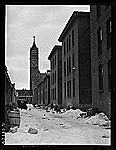


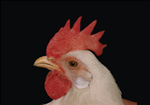
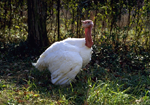
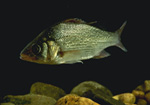

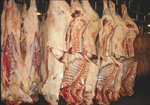
 and
and 